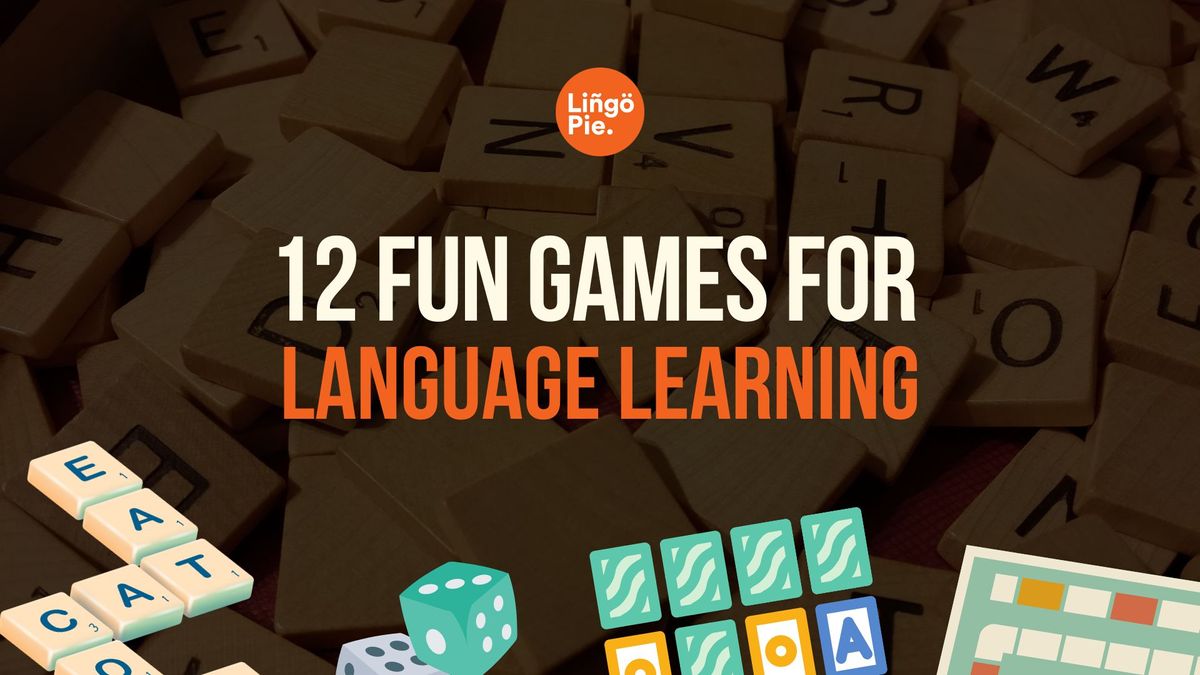Let's face it – learning a new language can be a wild ride. Some days you're on fire, nailing every new word and phrase. Other days? Well, let's just say it feels like your brain's gone on vacation without you. But did you know that language learners like you can make it much more fun with language learning games?
Yep, you read that right – games can seriously level up your language skills!
In this guide, I'm gonna share awesome language-learning games you can play with your buddies. Trust me, these aren't your grandma's boring flashcards. We're talking fun, interactive games that'll have you learning without even realizing it.
See also: How to Memorize Vocabulary in Another Language
Can you learn a language through games?
The language learning games market is on fire right now. We're talking about a projected growth of 6.4% year over year, set to hit a whopping USD 6,117.05 million by 2029.
So why are these games blowing up? Simple - they work, and people are catching on.
Here's the deal:
- Games make learning fun: When you're having a blast, you're more likely to stick with it. It's science!
- They reduce stress: No more sweating over textbooks. Games take the pressure off, so you absorb more.
- Instant feedback: Most games give you immediate results, so you know right away if you're on the right track.
- Repetition without the boredom: Games sneakily get you to practice the same stuff over and over, but in a way that doesn't make you want to tear your hair out.
- Real-world context: Many games (especially video games) simulate real-life situations, prepping you for actual convos in your target language.
So, if you've been struggling with traditional methods, why not give gaming a shot? With the market booming like it is, you'll have plenty of options to choose from. And who knows? You might just find yourself leveling up in your target language faster than you could ever imagine!
12 Best Language Learning Games
Whether you're a total newbie just starting out or you're looking to polish your already impressive skills, these games are gonna be your new best friends.
Each game on our list is:
- Easy to set up
- Adaptable for different language levels
- Perfect for playing with friends or study buddies
- Designed to target key language skills like vocabulary, grammar, and conversation
So, ready your game face (and maybe a snack or two), and let's get ready to play!
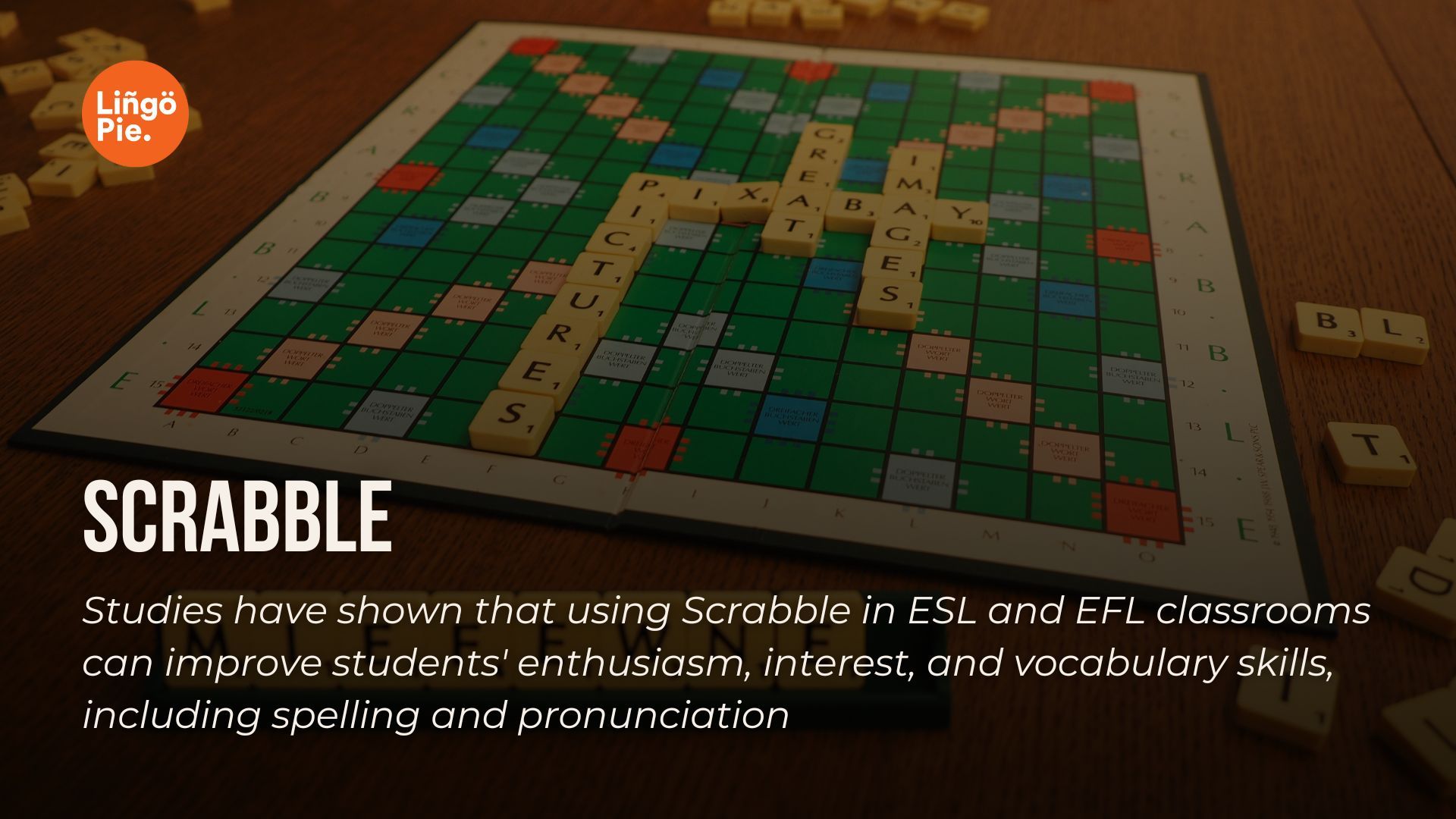
1. Scrabble
Best for: Vocabulary expansion, spelling practice, and strategic thinking
Scrabble challenges players to form words using letter tiles on a grid board. It's effective for language learners because it requires active recall of vocabulary and exposes players to new words.
The scoring system, based on letter values and board placement, adds a strategic element. In our opinion, playing with more advanced speakers can increase exposure to new vocabulary. If you do not have anyone at a higher level to work with, kep a dictionary handy to verify and learn unfamiliar words.
2. Vocabulary Bingo
Best for: Visual learners, vocabulary reinforcement, and listening comprehension
Vocabulary Bingo is a versatile game that can be easily customized for any language or skill level. Players create bingo cards with words or images representing specific vocabulary themes (like colors, clothing, or family members). One person calls out words, while others mark off corresponding items on their cards. The first to complete their card wins.
In our experience, this game effectively pairs words with visual representations, reinforcing vocabulary in a fun, interactive way. It's especially useful for improving listening skills and quick word recognition.
The best part? You can buy pre-made sets or easily create your own, making it adaptable to any learning needs or preferences. In short, Vocabulary Bingo turns repetitive vocabulary practice into an engaging, competitive activity suitable for learners of all ages.

3. Charades
Best for: Speaking practice, non-verbal communication, and vocabulary recall
Charades is a classic word-guessing game that adapts well to language learning. Players act out words, phrases, or concepts using only gestures and facial expressions, while others guess in the target language. It's typically played in teams, with points awarded for correct guesses within a time limit.
And you know what? After playing this for hours, we realized that Charades is a classic for a reason. This game simply excels at reinforcing vocabulary, as players must recall and use words actively! It also helps learners associate language with physical concepts, aiding memory. By requiring guesses in the target language, it provides speaking practice in a low-pressure, fun environment.
4. Word Association
Best for: Vocabulary recall, quick thinking, and listening comprehension
Word Association is a simple yet effective language game that requires no materials, making it perfect for impromptu practice. Here, players take turns saying words related to the previous one, creating a chain of associated terms. The game continues until someone can't think of a related word quickly enough or says an unrelated word.
In our experience, it's ideal for groups of two or more. This game challenges players to quickly recall vocabulary, reinforcing word connections and semantic networks in the target language. It also sharpens listening skills as players must pay close attention to each word.
In short, Word Association is particularly useful for expanding vocabulary range and improving fluency by encouraging rapid language production.
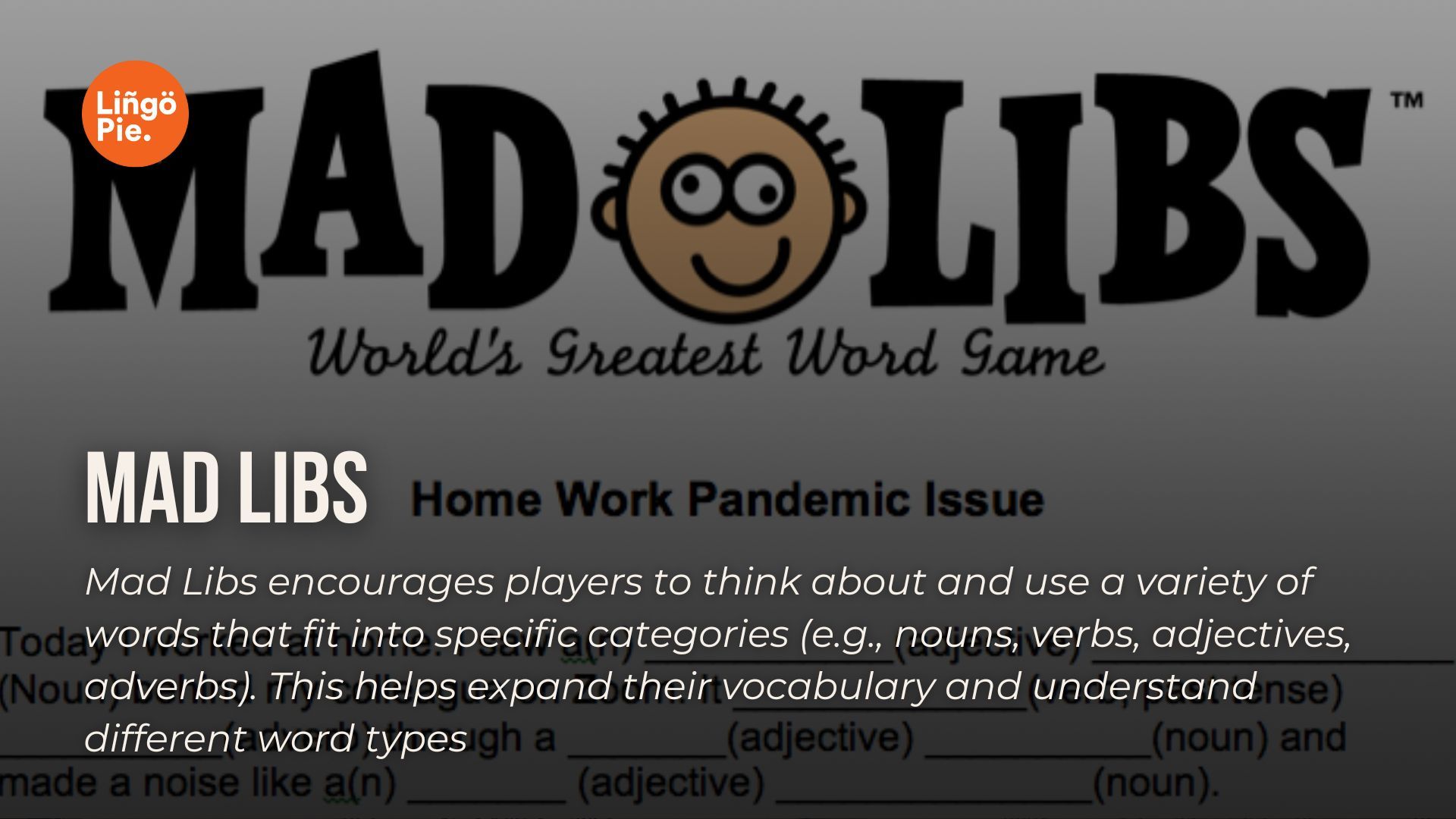
5. Mad Libs
Best for: Grammar practice, parts of speech recognition, and creative vocabulary use
This game generally relies on a Mad Libs book or an app that provides pre-written sentences with blanks for players to fill in.
The players must call out random words to complete the sentences and are given prompts, such as "noun", "adverb" or "place".
For instance, a Mad Libs book might provide the sentence "____! (exclamation) He shouted ______ (adverb), as he got into his ____(noun) with his ____ (adjective) wife."
Mad Libs sentences often take on an absurd or comical nature, which is part of what makes the game so fun. It is also a great game for vocabulary skills and learning the different parts of speech (nouns, verbs, adverbs, and so on).
6. Hangman
Best for: Spelling practice, vocabulary recall, and deductive reasoning
This is a very popular and fun game that only requires a pen and paper and a minimum of two people. In Hangman, one player comes up with a word or phrase and draws out a dash for each letter.
Then, the other player(s) guess which letters make up the word or phrase. For every letter guessed that isn't present, part of a stick man is drawn, hanging at the gallows.
The objective is to get the correct answer before the whole stick figure is drawn. Hangman is one of the best language-learning games that requires minimal resources. It's good practice for forming words and sentences, spelling, and vocabulary acquisition.
7. Kloo Game
Best for: Sentence construction, vocabulary building, and grammar reinforcement
The Kloo card game was created to help learners form sentences and learn more vocabulary. The cards have to be played in a certain order, starting with a red card, to make a cohesive sentence.
From these cards, players can learn phrases, deepen their vocabulary and have fun in a group. This game was designed with kids in mind, but it is fun for all beginner learners.
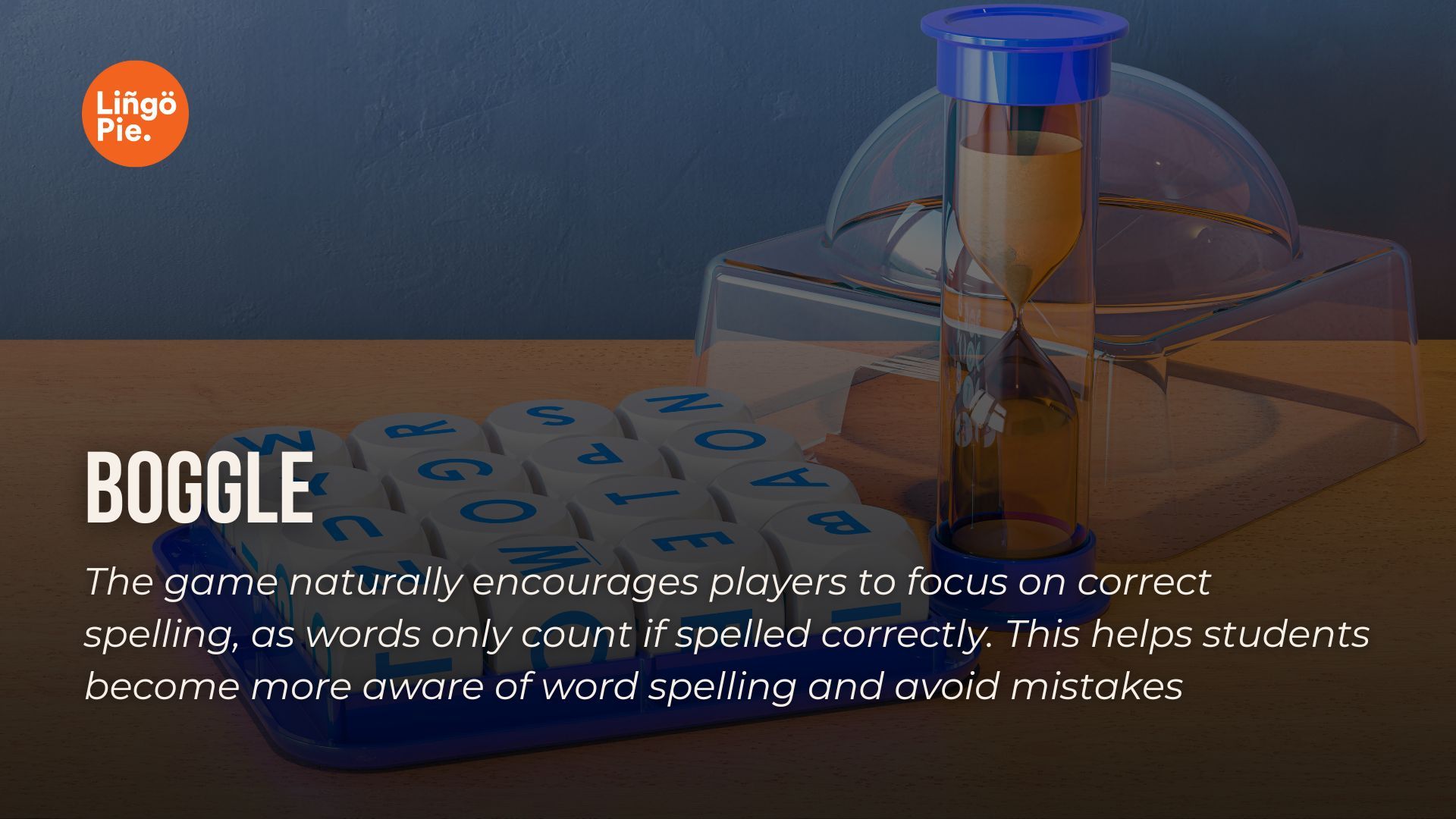
8. Boggle
Best for: Vocabulary recall, spelling practice, and quick thinking
Boggle is a fast-paced word-finding game played with 16 letter dice arranged in a 4x4 grid. Players have a set time to find as many words as possible by connecting adjacent letters in any direction, including diagonally. Longer words score more points, with a typical scoring system awarding more points for words of 5 letters or more.
This game enhances vocabulary recall and spelling skills in the target language, as players must quickly identify and form valid words. It's particularly effective for improving visual word recognition and mental agility in language use. Boggle can be played competitively or cooperatively, making it versatile for different learning environments and skill levels.
9. Spaceman
Best for: Spelling practice, vocabulary recall, and pronunciation
Spaceman is a variant of the classic Hangman game with a space-themed twist. One player chooses a word and draws blank spaces for each letter, along with a spaceship. Other players guess letters; correct guesses fill in blanks, while incorrect ones result in drawing parts of a stick figure being "abducted" by the spaceship. The game ends when the word is guessed or the stick figure is completed.
This game effectively reinforces spelling and vocabulary in the target language. It also provides pronunciation practice when players say the complete word. Spaceman can be easily adapted for different skill levels by using words, phrases, or even full sentences, making it versatile for various language learning stages.
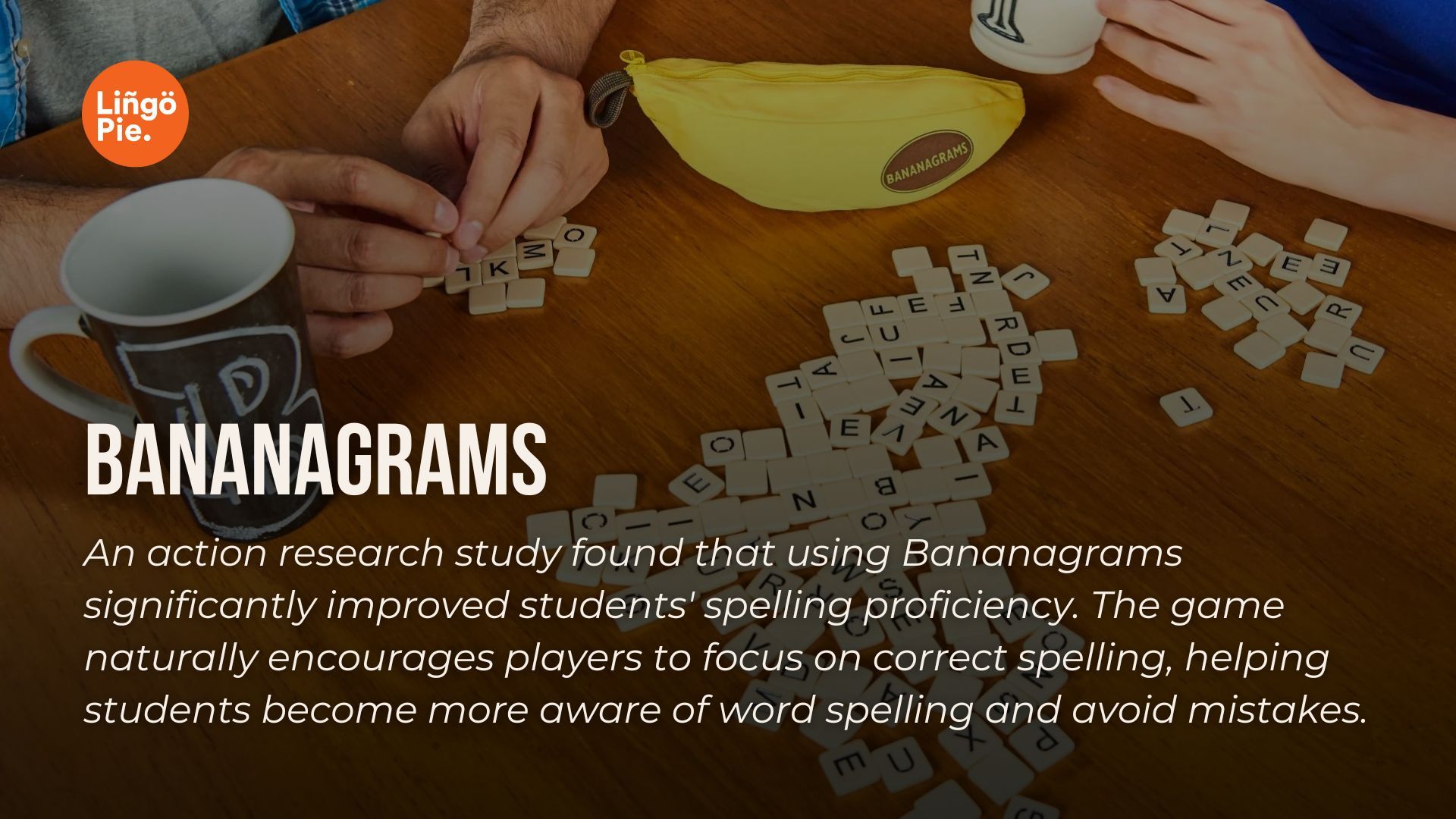
10. Bananagrams
Best for: Vocabulary building, spelling practice, and quick thinking
Bananagrams is a fast-paced word game that combines elements of Scrabble and crossword puzzles. Players race to use all their letter tiles to create interconnected words in a personal grid.
Unlike Scrabble, there's no board - players work independently and can rearrange their words at any time. The first player to use all their tiles and shout "Bananas!" wins.
This game excellently reinforces spelling and vocabulary recall in the target language. It also improves pattern recognition and word formation skills. Bananagrams' portable nature and quick gameplay make it ideal for impromptu language practice sessions. Its flexibility allows for various difficulty levels, making it suitable for learners from beginner to advanced.
11. Consequences
Best for: Creative writing, sentence structure practice, and collaborative storytelling
Finally, this is a super fun game that builds writing skills, improves sentence structure, and develops the acquisition of vocabulary words.
Each player has a piece of paper and writes a boy's name at the top. They then fold the paper so the name cannot be seen and pass it in a circle to the next player. They then write "meets" and a girl's name.
The paper is passed again and players write "at" and a location. This is repeated for "he said", "she said" and "the consequences were..." until each piece of paper tells a complete story in your target language.
If your friends use unknown words during the game, you can write these down and make them into flashcards. Then, you can all test one another on the new words.
12. Mad Gab
Best for: Listening comprehension, pronunciation, and phonetic awareness
Mad Gab is a word game that challenges players' ability to hear and interpret sounds in the target language. Players read nonsensical phrases aloud that, when spoken quickly, sound like common words or phrases. For example, "eye gulped hull of hen" sounds like "I got Poland".
This game sharpens listening skills and phonetic awareness as players must decode sounds rather than rely on written words. It's particularly effective for improving pronunciation and understanding of sound patterns in the target language.
Mad Gab can be adapted for various difficulty levels and is especially useful for learners struggling with the disconnect between written and spoken forms of the language. It's a fun, engaging way to practice pronunciation and listening in a group setting.
Video Games for Language Learning
Throughout the years, one emerging trend in language learning is using video games. And honestly...who can blame the learners? I mean, these digital playgrounds offer a fun way to immerse yourself in your target language, picking up vocab and grammar without even realizing it. From epic adventures to brain-teasing puzzles, there's a game out there for every learner.
Why video games rock for language learning:
- Immersive environments
- Real-time practice
- Repeat tough parts without the pressure
- Learn while having a blast
Check out these language-boosting games:
- Slime Forest Adventure RPG: Master Japanese kanji while battling slimes
- Waking Violet: Puzzle through Spanish and English in this 2D top-down adventure
- Noun Town: Dive into VR-based language learning
- Terra Alia: Explore a new world and language in this discovery RPG
Each game offers a unique twist on language learning, so you can find the perfect fit for your learning style and target language. Happy gaming and learning!
Other Fun Ways to Learn A New Language
1. Watch a Movie With Subtitles
One of the joys of modern technology is that there is so much content online that is high-quality and useful for language learning.
Lingopie boasts awesome content in 8 different languages for learners to binge-watch and enjoy. The platform also offers dual subtitles, so you can watch with English and foreign-language subtitles.
By immersing yourself in content featuring native speakers, you will improve your listening comprehension, pronunciation, vocabulary acquisition, and familiarity with traditions, customs, and slang in other cultures.
2. Language Exchanges
Another fun way to develop your language skills is by finding a language exchange partner. This can be online or in-person.
A language exchange partner will talk with you in their mother tongue for an agreed-upon amount of time, and then you'll switch and speak in your native language for the same amount of time.
This means it is a mutually beneficial agreement in which you both get to practice your target languages. This arrangement is more personal than language lessons and provides intensive and immersive exposure to a language.
It's a great and proven way to learn a new language and meet a new friend at the same time. The main benefits are exposure to slang and colloquialisms, listening and pronunciation practice, and the chance to have one-on-one instant feedback on your speaking.
3. Language-Learning Apps
Lastly, language-learning apps are great resources for learners who want to incorporate fun into their learning journey. These apps tend to focus on the acquisition of useful words and phrases for daily life and employ game-like methods and awards for the right answers to keep learners engaged.
Language learning apps tend to have a subscription fee, though some, such as Duolingo, offer a lot of content that is completely free. Some language apps, like Babbel, also come with quizzes and games.
Moreover, FluentU has a collection of themed decks of flashcards with specific vocabulary related to a useful topic.
Find the app that best suits your needs with this helpful guide to the 7 best language-learning apps.
FAQs: Language Learning Games
Are all games useful for language learning?
This list of 10 awesome language-learning games is not exhaustive. There are many other useful games for language learners including those found on language-learning apps and platforms, like Lingopie.
Remember, you can take any game that you love and simply play it in a foreign language for language practice.
Can you learn languages by playing games?
Yes, you can develop your language skills and acquire new useful vocab by playing a language-learning game.
You will develop your speaking skills by playing verbal word games in different languages, while the board game Scrabble will help you with spelling and
Consequences can help your writing skills. As long as all the players speak only in your target language, any of these games will help your listening skills, particularly Bingo.
What is the most fun language-learning game?
All of the above-listed language games are a lot of fun! If you love acting and moving about, Charades is perfect for you, whereas if you prefer more sedentary, technology-based games, Kahoot is your best friend.
Whatever your likes and skills, there's a game on this list that you'll love.
What is the fastest way to relearn a language?
The best way to relearn a language is immersion in the target language. You can achieve this by visiting a country in which the language is spoken, getting an exchange partner, or by playing great games with friends.
Just remember not to speak your mother tongue at all throughout the games!

Summing Up: Fun Games for Language Learners
And there you have it! This has been a simple guide to learning a new language with the best language-learning games.
From Mad Libs and Hangman to Kahoot, Kloo, and everything in between, you're now well equipped to take your language learning journey to the next level.
It doesn't matter whether you prefer a fast-paced board game or a relaxed, verbal game with friends, there's something here that suits you perfectly.
Any game that exposes you to language naturally is a great asset to your learning.
And remember, you learn best when you're having fun! Learners can also use language-learning apps, language exchange events, or foreign-language movies to develop their language skills.
If you're interested in learning a new language while watching great TV, movies and even music consider registering for a free trial on Lingopie.


